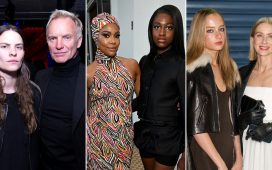Amid all the flash and sizzle of the 2021 Met Gala, Elliot Page stood out with a sharp and understated look. In his first red carpet appearance since coming out as transgender earlier this year, the Umbrella Academy star wore a slightly oversize black Balenciaga suit, pairing it with matching chunky sneakers. The clean lines only highlighted Page’s feeling of comfort in his own skin.
But against that simple backdrop, Page’s unique choice of boutonniere made a powerful statement. Pinned to his chest was a green rose.
The brightly colored flower is almost certainly a nod to queer forefather Oscar Wilde, the prolific Irish poet and playwright who was persecuted for his sexuality in the late nineteenth century. Wilde was famously tried on charges of sodomy and gross indecency, before facing imprisonment and dying in exile.
According to gay historian Dr. Andrew Lear, founder of Oscar Wilde Tours, Wilde’s fondness for green flowers dates to the premiere of his 1892 play Lady Windermere’s Fan, when he asked one of the actors to wear a green carnation, and told some of his young fans to do the same.
Despite the slight discrepancy that Wilde is associated with a green carnation rather than a green rose, Page’s homage still seemed intentional on the Met Gala carpet.
Although it’s hard to say whether Wilde intended the flower to be an expression of his sexuality, the green carnation was certainly claimed as a covert symbol of queerness. As LGBTQ+ historian Sarah Prager noted in a recent overview of queer-coded flowering plants, ever since 1892, “wearing a green carnation on your lapel was a secret, subtle hint that you were a man who loved other men.”
It may not be common practice anymore, queer people have used green carnations and other flowers to telegraph their identities to each other in public. Page’s decision to nod to that history on fashion’s biggest stage is significant, especially at a moment when transgender people are facing widespread public persecution around the globe.
His triumphant look at the Met Gala feels especially poignant given the difficulties he says such appearances caused him prior to coming out. In a sit-down interview with Oprah Winfrey this spring, Page recalled being unable to look at pictures of himself when he first rose to fame after the premiere of Juno.
“The Oscars, for example, I could not look at a photo from that red carpet,” Page said. “People might watch this and be like, ‘Oh my gosh, this person is crying about the night they went to the Oscars.’ I think that again prevents the ability to allow yourself to not just feel the pain, to reflect on the pain, to even begin to sit down and start to bring it all up and finally confront all of that.”
Ever since coming out, Page has become a welcome pop culture touchstone for trans perseverance and joy. The smile lighting up his face at the Met Gala was by far the most inspiring look of the night. And the green rose on his jacket sent a message of solidarity to any queer person who has ever felt like they had to hide who they are.
Get the best of what’s queer. Sign up for them.’s weekly newsletter here.








